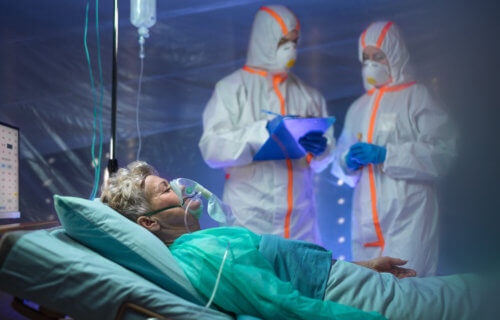BOSTON, Mass. — Monoclonal antibodies (mAbs) have proven to be an effective means of treating COVID-19 infections. Unfortunately, researchers from Harvard University report the very individuals most likely to develop severe COVID-19 symptoms (older adults) also happen to be the least likely to receive such treatments.
“Monoclonal antibodies should first go to patients at the highest risk of death from COVID-19, but the opposite happened—the healthiest patients were the most likely to get treatment. Unfortunately, our federal and state system for distributing these drugs has failed our most vulnerable patients,” says lead study author Michael Barnett, assistant professor of health policy and management at the Harvard Chan School, in a university release.
Monoclonal antibodies can help treat COVID infection cases ranging from very mild to severe. However, since these antibody treatments are often in short supply during the pandemic, federal guidelines recommend reserving monoclonal antibodies for those most at risk of severe COVID-19 symptoms, such as the elderly or people with compromised immune systems.
To get a better idea of monoclonal antibody distribution trends thus far, the research team analyzed an extensive dataset encompassing over 1.9 million Medicare beneficiaries who had contracted the coronavirus between November 2020 and August 2021. From there, scientists compared mAbs treatment rates and trends according to gender, age, region, race and ethnicity, and any pre-existing relevant chronic conditions.
Treatment disparity also varies from state to state
Among Medicare beneficiaries not needing hospitalization or who didn’t die within seven days of a COVID-19 diagnosis, only 7.2 percent received mAb therapy. Also, patients were actually more likely to receive mAb therapy if they had fewer chronic conditions. For example, 23.2 percent of patients with no chronic conditions at all received mAb therapy. Meanwhile, 6.3 percent of patients with one to three chronic conditions received monoclonal antibodies, as well as six percent of those with four to five chronic issues and 4.7 percent of patients with six or more chronic health issues.
Regarding race, African Americans were also less likely to be treated with monoclonal antibodies than Caucasians (6.2% vs. 7.4%).
Monoclonal antibody treatment distributions varied greatly from state to state as well. While Rhode Island and Louisiana gave out more mAbs to non-hospitalized patients with COVID-19 (24.9% and 21.2%), Alaska and Washington represented the opposite end of that spectrum (1.1% and 0.7%). In general, Southern U.S. states tended to administer the most mAb treatments (10.6% of beneficiaries), while Western states showed the lowest rates (2.9%).
Researchers say their findings make it clear that high-risk patients aren’t being provided with enough access to monoclonal antibodies. As for why this is happening, study authors theorize many high-risk patients have a tough time “navigating the multiple steps needed to receive mAbs.” Such steps include an early diagnosis, a speedy referral, and a scheduled infusion within 10 days. On a state-to-state level, certain regions of the country likely ran into more supply issues than others.
“We need new approaches to prevent these inequities from happening again with newer treatments on the horizon,” Prof. Barnett concludes.
The study is published in JAMA.
